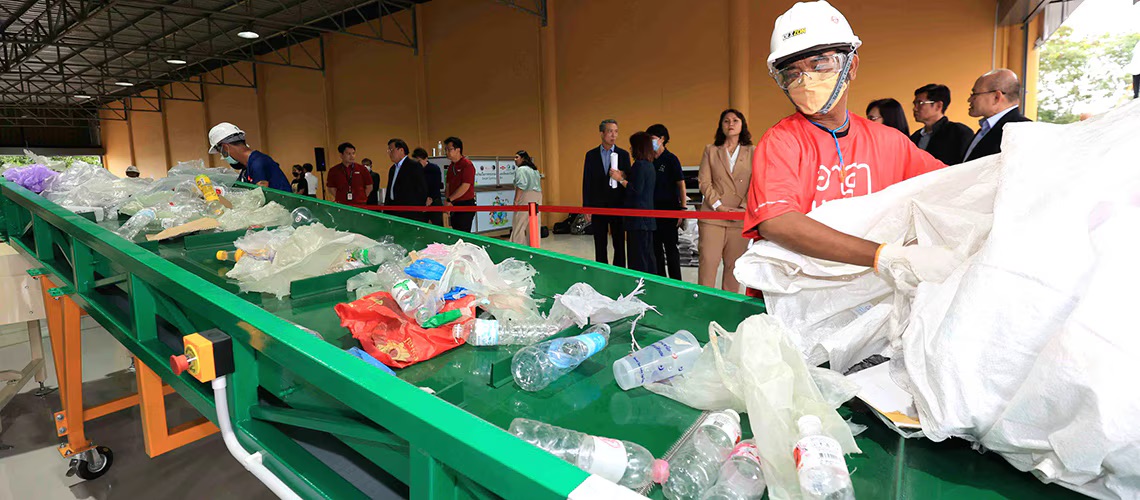Supporting a Circular Economy in Thailand
Rhea-AI Summary
Dow has launched a Materials Recovery Facility (MRF) in Rayong Province, Thailand, marking the country's first community-owned enterprise for high-quality plastic waste recovery. The facility, opened in 2023, aims to prevent over 1,000 tons of plastics and materials from entering landfills annually and reduce greenhouse gas emissions by 2,400 tons of CO2eq per year.
The initiative, funded through Dow's Business Impact Fund and the Thai government, focuses on waste management, plastic packaging recovery, and material transformation. The project has created four full-time jobs and provides income opportunities for local communities through recyclable waste sales and upcycled products. The MRF involves collaboration with multiple Thai partners, including the Thailand Institute of Scientific and Technological Research, Plastics Institute of Thailand, and local government bodies.
Positive
- Project expected to prevent 1,000+ tons of plastics from landfills annually
- Estimated reduction of 2,400 tons CO2eq emissions per year
- Created 4 full-time jobs in the local community
- Generates additional income streams for community members
Negative
- None.
News Market Reaction 1 Alert
On the day this news was published, DOW declined 2.33%, reflecting a moderate negative market reaction.
Data tracked by StockTitan Argus on the day of publication.
NORTHAMPTON, MA / ACCESSWIRE / December 4, 2024 / How are we building a circular economy for plastics in Thailand? The simple answer is 'together'-because it takes a village, or in this case, the entire community.
Building a circular economy: An introduction
A circular economy for any type of material is a disruption to the traditional, linear thinking of "take-make-dispose" in which natural resources are developed into products and then disposed of after use. It is a new way of doing business and consuming goods that maximizes the value of resources-supporting the repurposing, or circularity, of materials.
This transition is important to support a more sustainable future around the world, and it will take collaboration and innovation to achieve it. A circular economy takes a product's total lifecycle into account-from the resources used to create it, to how it is made, to its use, disposal, and reuse.
Circularity can help the world meet a wide variety of complex sustainability challenges like the conservation of biodiversity, addressing pollution, and protecting the climate.
What is the materials ecosystem?
The materials ecosystem around plastic and renewable waste harnesses recycling technologies and circular solutions to recapture this value, thereby reducing landfill, incineration, and environmental leakage.
To drive progress, collaboration is key. This includes developing new technology to transform waste, investment in effective recycling infrastructure and circular systems, supportive policies, brands designing for circularity, and consumers believing their recycling efforts matter.
Working within the community to strengthen the circular economy in Thailand
Our team in Thailand has been actively engaging local communities-from government organizations to academic institutions-to help identify and enable solutions to environmental challenges faced in the region while supporting economic and social opportunity in those communities. This cross-sector collaboration allows us to work alongside local partners to effectively deploy innovations and technologies for positive impact.
One way we work within communities around the world is through the Dow Business Impact Fund. Launched in 2016, our Business Impact Fund leverages Dow's technology and expertise to unlock innovative solutions for some of the world's most pressing challenges. Funding proposals come directly from our employees worldwide, tapping their unique skills, business knowledge and diversity of locations and experiences.
Our collaboration to develop a Materials Recovery Facility in Thailand
The Plastic Circularity Community Enterprise Material Recovery Facility (MRF) opened in 2023 in Rayong Province, Thailand near one of our existing manufacturing sites. The MRF aims to manage waste, used plastic packaging, and discarded materials in Ban Chang, Rayong.
The project adopts a circular economy and sustainability framework to encourage waste segregation, improve the recovered material's quality, and develop new products from waste. The collaboration also includes wastewater treatment and energy generated from refuse-derived fuel (RDF). The RDF is a composite material produced from post-consumer and commercial waste, including scrap wood, fruit peels and multilayer plastics.
The MRF initiative expects to sort and enhance the quality of recyclable materials, with the goal of preventing over 1,000 tons of plastics and other materials from ending up in landfills every year. By returning these materials to the production stream, this initiative estimates that it will reduce greenhouse gas emissions by 2,400 tons of CO2eq annually.
Enabled by a grant from the Dow Business Impact Fund and matching funding from the Thailand government, this pilot project is also Thailand's first community-owned enterprise for high-quality plastic waste recovery. In addition to reducing plastic waste and providing a source of high-quality secondary raw materials and renewable feedstock for our polyethylene production in Thailand, the successful implementation will also help generate sustainable income for the local community.
Combining experience and expertise
This endeavor demonstrates how much can be achieved by working side by side across organizations, sectors, and stakeholders. The MRF initiative aims to both support the local economy and prevent waste from entering the environment.
Our collaboration with the local community began through a partnership called Improving Community's Segregated Plastic Waste through Science, Technology, and Innovation. We initiated this partnership with the Thailand Institute of Scientific and Technological Research (TISTR) in 2021. That collaboration, through the combined experience and expertise of its partners, enabled the community engagement necessary to develop Thailand's first high-quality MRF.
Growing collaboration
Over time, the partnership has expanded to attract more local strategic partners across sectors, each playing a critical role in driving the initiative forward.
Our Thai collaborators on the MRF initiative include:
Program Management Unit for Competitiveness: providing government funding
Thailand Institute of Scientific and Technological Research: supporting local and cost-effective technologies and machines
Plastics Institute of Thailand: supporting business model development
Rayong Province & Ban Chang District: supporting project implementation and execution
Ban Chang Municipality: providing an area for operations, preparing infrastructure and utilities
Scaling a sustainable model
The MRF initiative has been collaborative before the idea was even set into action. It began as a series of public hearing sessions to understand local needs. Over 400 members of the community attended these sessions.
Since the start-up of the MRF in September 2023, the initiative has created four full-time jobs that focus on waste collection and sorting, waste record tracking, and facility maintenance. At the same time, community members can increase their income by selling recyclable waste to the facility and by reselling upcycled products associated with facility operations.
As the MRF initiative is fully deployed, the goal is to engage more community members in the Ban Chang District through an online application system and an increase in the number of waste collection hubs. The initiative aims to continue expanding partnerships with local schools, temples, department stores, and government offices throughout the second half of 2024. With additional waste storage area and expanded building space, the initiative intends to assess staffing to meet program growth and the facility's overall capacity.
As the initiative proceeds, the results of a broader survey are expected in early 2025 that will serve as the foundation for a formalized Community Benefits Plan. This will help create and sustain the Just Transition to a healthy, circular economy in the local area.
Unlocking the value of waste
Waste should be viewed as a valuable resource waiting to be harnessed. We are witnessing firsthand how barriers to transforming waste are being broken down through technology, and the value of recycled materials is increasing.
The materials ecosystem allows us to address current gaps, connect the best partners, and disrupt how the world values, sources, transforms, and monetizes waste.
About the article
This case study was developed by a cross-discipline team representing geographic, social equity, materials and sustainability expertise across Dow, Inc. To learn more about how Dow is accelerating positive social change and creating a sustainable future, visit the Company's Purpose in Action pages.

View additional multimedia and more ESG storytelling from DOW on 3blmedia.com.
Contact Info:
Spokesperson: DOW
Website: https://www.3blmedia.com/profiles/dow
Email: info@3blmedia.com
SOURCE: DOW
View the original press release on accesswire.com






